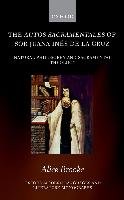Sor Juana In?s de la Cruz (1651-1695) was the most significant literary figure of the colonial period in Spanish America.The autos sacramentales, or Eucharistic plays are some of her least studied, and most perplexing works. While one of them, El divino Narciso, has received substantial scholarly attention, the other two, El cetro de Jos? and El m?rtir del Sacramento, San Hermenegildo, have been critically neglected in Sor Juana studies. This study presents a full-length analysis of all three plays, along with their loas, or the introductory pieces alongside which they were intended to be performed. Furthermore, the study seeks to place these works in their philosophical and cultural context by exploring their engagement both with orthodox Catholic sacramental theology, and the emergence of empiricism and the New Philosophy across the Hispanic world. The three sections of this book each present significant new readings of the three plays. The study of El divino Narciso employs a previously little-known source to illuminate its Christological readings, as well as Sor Juana's engagement with notions of wit and conceptism. The analysis of El cetro de Jos? explores her presentation of different approaches to perception to emphasise the importance of both the material and the transcendent to a holistic understanding of the Sacraments. The final section, on San Hermenegildo, explores the influence on the play of the Christianised Stoicism of Justus Lipsius, and demonstrates how Sor Juana used the work to attempt her most ambitious reconciliation of an empirical approach to natural philosophy and the material world with a Neostoic approach to Christian morality and orthodox Catholic sacramental theology.

